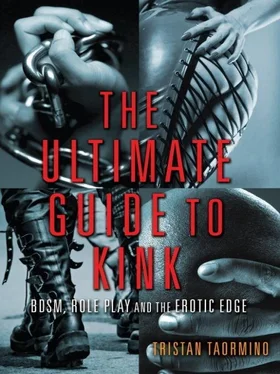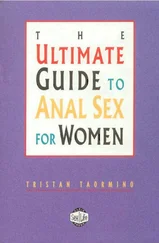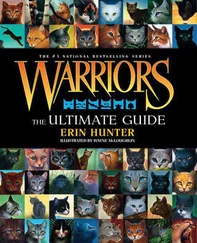But getting more presented a substantial challenge.
Fantasizing about acts that are manifestations of nonconsensual encounters is one thing. Deciding to consciously explore them is another. I think we can all agree that the violence of rape and sexual assault, the violence of bigotry and racism, the horror of sexual abuse, the crime and horror of incest, are not acceptable. They are inexcusable, criminal acts of violence.
So how can it be that so many of us have fantasies along these lines? How can it be that, in one breath, I can condemn the rapist and yet fantasize about being ravaged and raped?
There are two fundamental concepts here: consent and intent.
The intent of those participating in taboo role play is not to harm others. Their intent may vary. It can be a reclamation, a re-creation, an exploration—but it is never a decimation, an obliteration of the humanity of the people involved. Intent is all-important when diving into these dark waters.
Consent is also pivotal. Inasmuch as a person who engages in a fantasy about being used and degraded by a terrifying sexual predator has consented to the scenario being manifested, the acts are elevated above criminality. Rape, incest, abuse based on race, gender, sexual preference, or physical ability are not acceptable— unless they are . Once these taboos are brought to light as a forbidden fruit that the participants willingly, and with open eyes, choose to ingest, the game is entirely different. It can be transmuted, with negotiation and consent, to a profound exploration of the darkness within us all. It can be everything from light and fun to darkly cathartic.
But you must enter into this maze with a grounded sense of yourself, your motives, and your desires, and an awareness of the inherent and hidden risks.
Let me be very clear. I am in no way condoning any behavior that is nonconsensually perpetrated upon another person as a means of physical and emotional violence. Rather, I am saying that those who desire to explore these fantasies in the context of a consensual, self-aware, intentional exploration of personal desires ought not be reflexively pathologized. I believe that these fantasies can be deeply empowering, and we should give ourselves permission to dig in this dirt.
It is vital to understand that consent must be granted by all involved parties when exploring scenarios that employ physical manifestations of violence and psychological shades of coercion. As someone who has been on the receiving end of sexual assault, I can tell you firsthand that there is a universe of difference between the dark seduction of a rape-play fantasy and fighting off a would-be attacker or being taken advantage of via emotional pressure or coercion. Consent and choice are what sets this type of play apart from abuse and assault. I choose the time, the place and the partners with whom I play in this realm. I make the decision with a clear-eyed and sober mind-set. I negotiate and I check in. I know my partners will be with me before, throughout, and in the aftermath of our shared experience. And I know that they care for me. The sexual abuser or rapist is not in the business of negotiation and thoughtful, caring planning. Your fantasy and desire is not their [21] 1 As in my previous chapter, I deliberately use the plural pronouns they , them , and their to refer to singular persons of any gender, in place of “he or she,” “him or her,” “his or her.” Although this is nonstandard grammatical usage, the traditional forms reflect a gender binary to which I do not subscribe.
concern.
Playing in the realm of consensual nonconsent may blur the lines of default “No means no!” language. But remember, all involved parties must give consent to and accept responsibility for the risks associated with these boundary-pushing scenes. Everyone assumes a risk. Being aware of and prepared for these risks is pivotal. Maintaining boundaries is not something to be compromised.
Taboo role play is heavy stuff, for sure. So why go there? Why dabble in behavior that tips on the edge of consent? There are as many reasons as there are people who choose to walk these dark paths. Some people are simply sexually curious—dark fantasies arouse their inquisitiveness, so they go for it. Others have demons they wish to exorcise, fears that are rooted in a very real situation that they seek to recast and over which they seek to gain control. This type of role play is a means by which they might access that past. Still others are specifically aroused by the forbidden nature of it. The edgier and riskier the game, the more desirable it is to play.
Many publicly eschew edge play , as it is called, and make an effort to demystify kink by downplaying the risks and the danger.
I have spoken to thousands of people in the kink/leather/BDSM community, and thousands who are not involved with this subculture, about their private sexual fantasies. What I find striking is that among those who are not actively leading a lifestyle that openly embraces kink, there is less stratification and judgment about the content of forbidden fantasies.
Perverts often have a great deal invested, egowise, in codifying and justifying their kinks and fetishes. Many publicly eschew edge play , as it is called, and make an effort to demystify kink by downplaying the risks and the danger. Nonkink-identified people tend to have a “kinky is kinky” approach, which paradoxically gives them an initial advantage in processing taboo desires. When I came out to my nonkinky friends as submissive and confided that I was struggling with having fantasies that included scenes mirroring historical abuses, their reaction was generally “Okay, well that’s pretty kinky!” Whereas revealing the same desires within BDSM communities earned me widespread ostracism, questioning of my “blackness,” insinuations that I was mentally ill, threats against me and any potential partners “caught doing that fucked-up shit,” and all manner of ridicule. Not all kinks are created equal.
One doesn’t have to look far to find kinky people playing out the fantasy of the innocent schoolgirl/schoolboy over the knee of a stern disciplinarian. But darken the sexuality of it, add the sheen of sexual exploitation, coercion, or force, and the level of discomfort spikes. Reconciling something as horrific as the sexual abuse of children with the fantasy of playing that scene is a razor-edge dance. Many of our fantasies are rooted in real nightmares, fueled by the energy of real demons. But does this mean we ought to cut ourselves off from them, and in so doing, alienate ourselves from a base but valid aspect of our psyche? Does it mean we wish to actually abuse the innocent in a nonconsensual way? Does having a rape fantasy mean you desire to be beaten and sexually assaulted by a violent predator?
Most likely, the answer is no. But it is a human thing to desire to explore that destruction, that entropy, and there are safer ways to explore it. Just as we might watch a slasher flick to get that adrenaline rush of terror, we can put ourselves, for a little while, into a situation that feels very risky, that mimics that sickening rush of fear, so as to embrace the shadow of that horror.
To those who would explore these dark places, I first advise some really honest soul-searching. Where does this desire come from? Do you have a past hurt you would like to explore? Is it simply something that turns you on? Are you willing to deal with the possible aftermath: potential “buyer’s remorse” after engaging in this play when you look back and second-guess your motives, and your partners’?
Читать дальше












